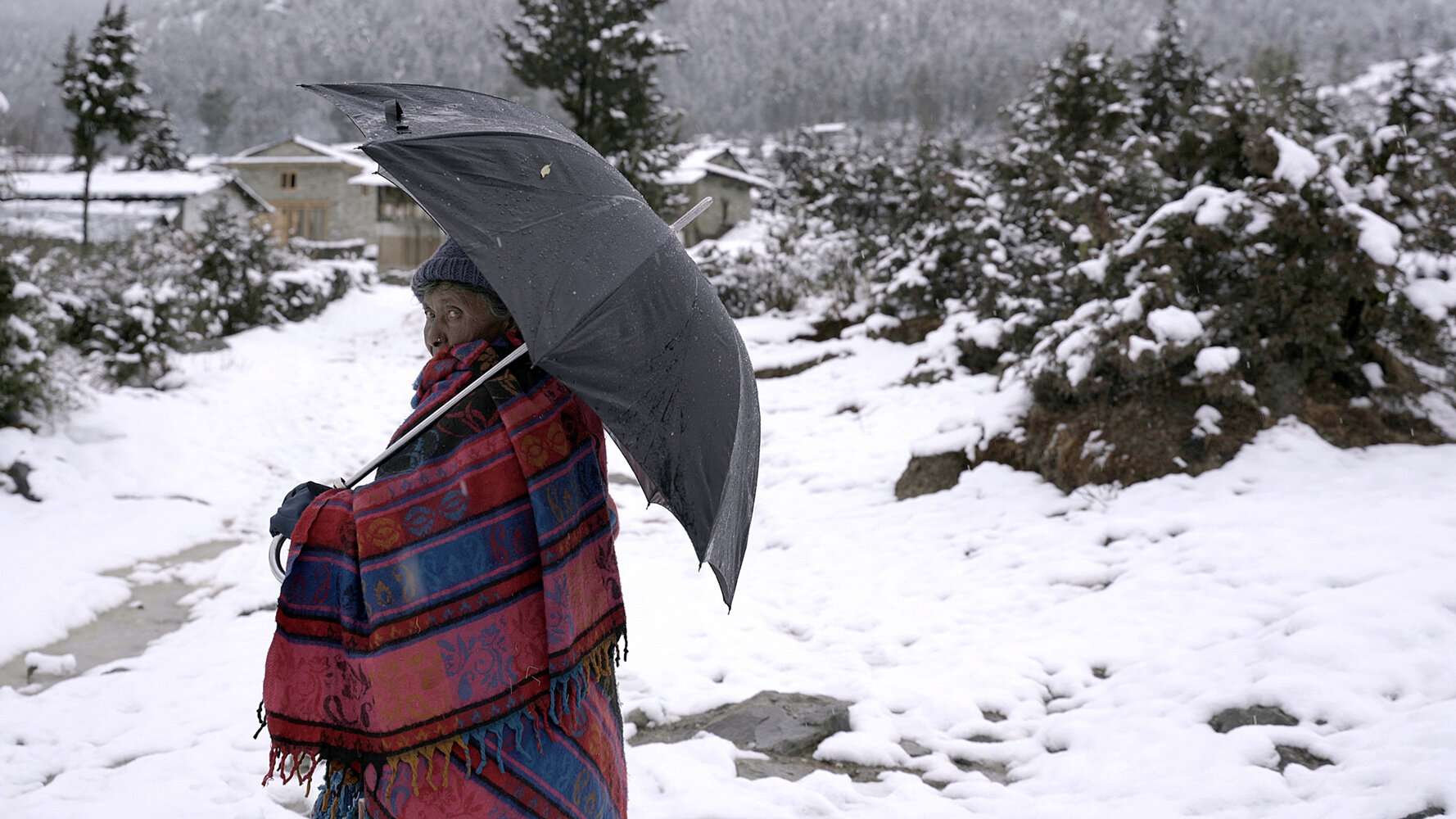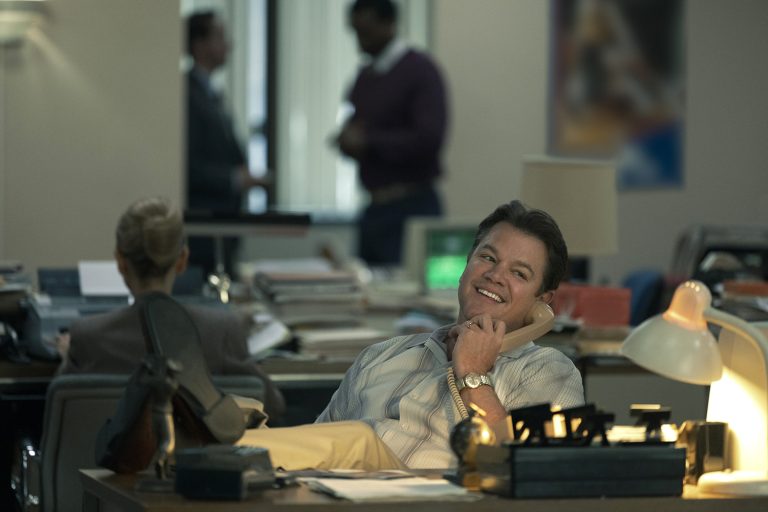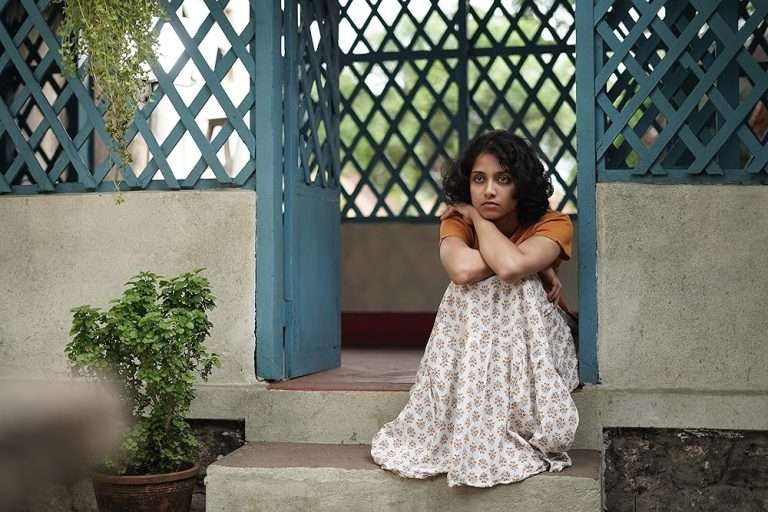There is an overwhelming expanse that almost always frames the characters of No Winter Holidays. The film opens in the Dhor Valley of Nepal at the peak of winter. We are told everyone has left the village except the two women who happen to be widows of the same man. Ratima and Kalima are neighbors. We watch them negotiate the stark abandonment of their village. The blanketing whiteness around them is a constant, putting their lives on an anvil of sorts.
Yet, neither of them is a whiner about their circumstances. They simply cannot afford to, having long resigned to the unavailability of provisions and inaccessibility to resources. Directors Rajan Kathet and Sunir Pandey capture the women at work through all times of the day and night- scouring for food, cooking, eating, and washing.
The gaze is resolutely unsentimental and mirrors the workmanlike ways with which the women conduct their lives. We watch them trudge through fierce snowstorms of nights and the calm loneliness of mornings, both reminding them of the solitariness of their status, their deeply vulnerable position, entirely stripped of comfort and safety. The directors hew close to the women walking miles and miles, foraging for greens, feeding goats, calling after their cows that have strayed, beckoning them home.
Impressions of their intimacy with each other and kinship to their environment make for their sustenance to form quickly. But Kathet and Pandey forgo the space of their daily exchanges for a largesse of portions wholly devoted to encompassing their respective routines, which also collide.
Theirs is a life built on rigor but also, as one of them admits quite frankly, a slew of mistakes that could have been averted. As the women speak, there is a lingering tinge of regret in the air. They are aware that their circumstances are not ideal, hostile to their precarious age, and unkind to each other but have to work around them since there is no alternative, or even if there were, they themselves have whittled it away due to a dash of headstrongness or stubbornness. Ratima wistfully wonders about the trajectory her life would have taken if her husband no longer cared for her after marrying Kalima; she ponders pensively that perhaps she might have remarried and moved somewhere else.

The locations naturally lend themselves to gorgeous vistas shot with awe, wonder, and formidable, looming menace by Babin Dulal. There is an overkill of wide shots of the village at all hours of the day that look like a forlorn outpost, the very tether of civilization, rolling mist draping it, in which these two specks of human subjects are straggling it out to carve a habitable existence. The film sparkles with life only in bits. It fits wherever the women actually express their frustrations and are irate about each other or some relative or village authorities who are mostly swindlers.
In an early scene, the two vents to one another about common bad experiences at the hands of cops and their wives, who exploit their inconveniences for their ends. While Kalima is a chatty woman, blabbering all the time, Ratima is more reserved, taciturn, and keeping to herself. Ratima talks about her dreams where her husband appears to her. She explicitly highlights that Kalima, the second wife, has no such dreams. She sings her fears that sickness will take her away soon.
The film establishes Ratima as a figure mostly vis a vis her devotion to her late husband. She built a footbridge as a resting place in his memory, which her nephews took over. Kalima is portrayed as someone who is eagerly looking forward to reuniting with her daughter. The women’s respective, individual bonds are delineated with a keen difference. But Kalima also projects some concern and tenderness towards Ratima over the latter’s ailing health. Kalima rebukes her for not abstaining from alcohol even when medicines have almost run out. She often proposes that she sleep over at hers for the night after they finish their dinner together, which Ratima declines.
The directors visibly struggle and strain to wrench out palpable human drama from what is an abundantly fascinating premise of two old women who have a dead husband in common, stranded by their own volition in a desolate frozen setting. They turn it into something drab and dreary, zooming recurrently onto the landscapes but not tapping the rich psychological potential in the narrative. The sporadic spurts of tussle animating the dynamic between Ratima and Kalima offer us the tantalizing scope atrophied by directorial choices.
At one point, Kalima, who has been out in anxious pursuit of her missing goat in a relentless blizzard, returns home, chides, and lashes out at Ratima’s lack of consideration for letting her clothes remain in the snow and not taking them inside. Ratima, from her room, also berates her in return, even remarking she would like to beat her a day. I wish the film had more such liveliness that would have made us invest in these characters.


![Diane [2019] Review: A carefully observed character drama of a woman who understands need](https://79468c92.delivery.rocketcdn.me/wp-content/uploads/2019/04/Diane_HOF2-768x433.jpeg)




